|
|
|
|
|
|
|
|
|
USARC Commissioner Jacqueline Richter-Menge to deliver the Nye Lecture at the 2018 AGU Fall Meeting, December 11, 2018 (Washington, DC USA).The US Arctic Research Commission (USARC) is pleased to announce that Commissioner Jacqueline Richter-Menge will present this year's Nye Lecture, titled "A Career of Change," at the Fall Meeting of the American Geophysical Union (AGU) in Washington, DC at 2:50 pm on Tuesday, December 11, 2018 in the Marquis room of the Marriott Marquis Hotel, 901 Massachusetts Ave. NW, Washington, DC 20001.
Arctic Report Card Release, December 11, 2018 (Washington, DC USA). The National Oceanic and Atmospheric Administration 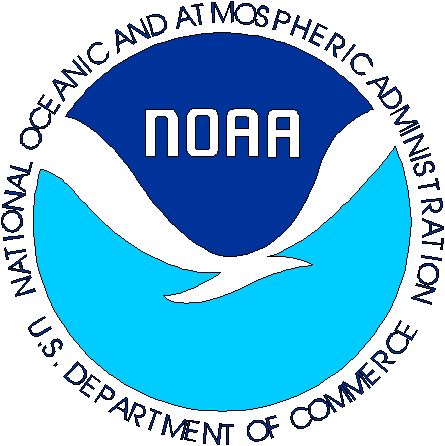 (NOAA) is expected to release the 2018 Arctic Report Card during the American Geophysical Union (AGU) annual fall meeting. A press conference of the release will be steamed live on the AGU press events webpage- see here. The 2018 Arctic Report Card brings together the work of more than 80 scientists from 12 nations to provide the latest information on Arctic environmental change, including air and sea surface temperature, sea ice, snow cover, the Greenland ice sheet, vegetation and the abundance of plankton at the base of the marine food chain. This year's peer-reviewed report led by the U.S. National Oceanic and Atmospheric Administration will also include special reports on the health of caribou and reindeer populations, harmful algal blooms, microplastic pollution, and connections between Arctic weather patterns and severe weather in the more populous mid-latitudes. (NOAA) is expected to release the 2018 Arctic Report Card during the American Geophysical Union (AGU) annual fall meeting. A press conference of the release will be steamed live on the AGU press events webpage- see here. The 2018 Arctic Report Card brings together the work of more than 80 scientists from 12 nations to provide the latest information on Arctic environmental change, including air and sea surface temperature, sea ice, snow cover, the Greenland ice sheet, vegetation and the abundance of plankton at the base of the marine food chain. This year's peer-reviewed report led by the U.S. National Oceanic and Atmospheric Administration will also include special reports on the health of caribou and reindeer populations, harmful algal blooms, microplastic pollution, and connections between Arctic weather patterns and severe weather in the more populous mid-latitudes.
First Results From NASA's New Ice-Measuring Space Laser, December 11, 2018 (Washington, DC USA). Glacier crevasses, cracks in sea ice and forest canopies - the first height data from NASA's Ice, Cloud and land Elevation Satellite-2 are so clear that scientists can easily distinguish these and other features of Earth's surface. At this press conference, scientists will present the first results and new data visualizations from ICESat-2, which launched Sept. 15. They'll discuss how the airborne Operation IceBridge campaign led into ICESat-2 and how the satellite's seasonal measurements of changing ice sheets and sea ice will lead to better understanding of sea level rise and global weather and climate patterns.
American Geophysical Union Fall meeting, December 10-14, 2018 (Washington, DC USA). The AGU 2018 Fall Meeting will mark another dynamic year of discovery in Earth and space science, serve as the advent of AGU's Centennial year, and provide a special opportunity to share our science with world  leaders in Washington, D.C. As the largest Earth and space science gathering in the world, the Fall Meeting places you in th e center of a global community of scientists drawn from myriad fields of study whose work protects the health and welfare of people worldwide, spurs innovation, and informs decisions that are critical to the sustainability of the Earth.
ArcticNet: Annual Scientific Meeting 2018, December 10-14, 2018 (Ottawa, ON Canada). Canada's North is experiencing unprecedented change in its sea and terrestrial ice, permafrost and ecosystems under the triple pressures of climate change, industrialization and modernization. The impacts of these pressures can be seen on food and energy security, shipping, sovereignty, northern community health and well-being, and sustainable development and resource exploitation. All these issues have brought the North to the forefront of national and international agendas. Building on the success of its previous Annual Scientific Meetings and International Arctic Change Conferences, the Arctic Network of Centers of Excellence announces the 14th ArcticNet Annual Scientific Meeting.
|
Media
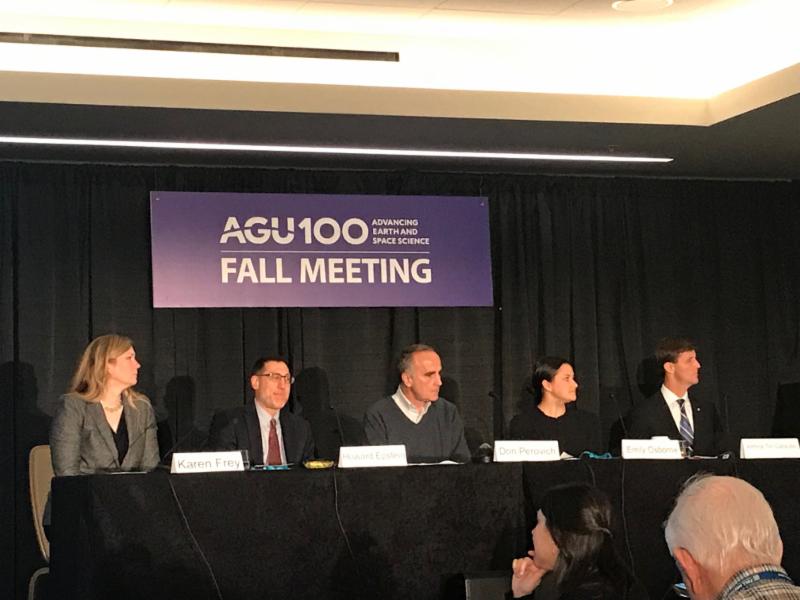 The Arctic Report Card. The Arctic Report Card. National Oceanic and Atmospheric Administration released the 2018 Arctic Report Card today. Issued annually since 2006, the Arctic Report Card is a timely and peer-reviewed source for clear, reliable and concise environmental information on the current state of different components of the Arctic environmental system relative to historical records. For 2018, continued warming of the Arctic atmosphere and ocean are driving broad change in the environmental system in predicted and, also, unexpected ways. New emerging threats are taking form and highlighting the level of uncertainty in the breadth of environmental change that is to come. Arctic Program
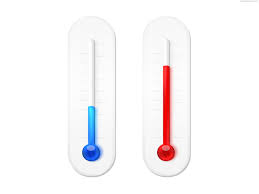 The Arctic's Warmest 5 Years on Record: 2014- Present. The Arctic's Warmest 5 Years on Record: 2014- Present. The Arctic has been warmer over the last five years than at any time since records began in 1900, and the region is warming at twice the rate as the rest of the planet, scientists said Tuesday. The rising air temperatures are having profound effects on sea ice, and on life on land and in the ocean, the scientists said. The changes can be felt far beyond the region, especially since the changing Arctic climate may be influencing extreme weather events around the world. The New York Times
The Arctic is in Even Worse Shape Than You Realize. Over the past three decades of global warming, the oldest and thickest ice in the Arctic has declined by a stunning 95 percent, according the National Oceanic and Atmospheric Administration's annual Arctic Report Card. The finding suggests that the sea at the top of the world has already morphed into a new and very different state, with major implications not only for creatures such as walruses and polar bears, but in the long term, perhaps, for the pace of global warming itself. The Washington Post
Collapsing Buildings, Crumbling Roads, and Sinkholes: Shocking Study Reveals How Millions of People in the Arctic Will be at Risk From Thawing Permafrost- and the Effects Have Already Begun. Thawing permafrost will soon pose substantial risks to nearly four million people living in the Arctic. An alarming new study has found that by 2050, nearly three quarters of the population living within the Northern Hemisphere permafrost area may be affected by infrastructure damage resulting from thaws. Daily Mail
|
|
Future Events
Keynote: US Senate Perspectives on Science Policy, December 12, 2018 (Washington, DC. USA). U.S. Senators Lisa Murkowski of Alaska and Maria Cantwell of Washington will discuss today's top science policy topics, from hazards to scientific integrity. The senators will be sharing remarks on the science policy issues facing their constituents and the world, followed by a Q&A moderated by AGU CEO and Executive Director Chris McEntee. This event is part of the American Geophysical Union Fall Meeting.
The Synoptic Arctic Survey Informational Meeting During the AGU Fall Meeting, December 13, 2018 (Washington, DC USA). The Synoptic Arctic Survey (SAS) will be hosting an informational meeting during the American Geophysical Union (AGU) 2018 Fall Meeting. This open meeting will convene 12:30 - 1:30 p.m. Eastern Standard Time on Thursday, 13 December 2018 at the Cambria Hotel Washington D.C. Convention Center (899 O Street NW, Washington, DC, 20001), Duke Ellington Room 1, in Washington D.C. The SAS is a developing international program envisioned to mount a coordinated, multi-nation, oceanographic field-based effort on a Pan Arctic Scale quasi-synoptically over a single season to achieve the baseline understanding of the fundamental structure and function of the linked carbon-ecosystem-physical systems that will permit detection of ongoing and future changes. Development of the program has been ongoing since 2015.
Fast Thaw, December 14, 2018 (Washington, DC USA). Arctic 21 will host a presentation with Dr. Katey Walter Anthony. The discussion with consider permafrost thaw and methane emissions from lakes in the Arctic.
'UK-US Maritime, Aerospace and Security Cooperation in the Arctic'. Delegates will discuss and debate trade and security-focused Arctic collaboration in the Arctic between US, the UK, and their allies. This convening is designed to deepen the UK-US special relationship by strengthening trade and cooperation in four areas in particular: maritime services, aerospace, fisheries, defense and security. The Arctic Encounter London is co-produced by the Polar Research and Policy Initiative and the Arctic Encounter. The Polar Research and Policy Initiative (PRPI) is a London-based international think-tank dedicated to Arctic, Nordic, North Atlantic, North Pacific and Antarctic affairs. The Arctic Encounter is the largest annual Arctic policy and business conference convening in the United States, with partnerships and convening efforts worldwide.
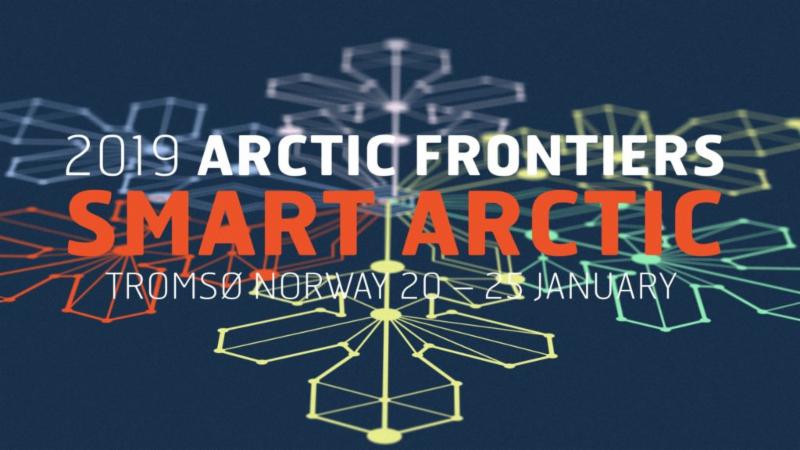 Arctic Frontiers, January 20-25, 2019 (Tromso, Norway). The Arctic Frontiers is a global scientific conference on economic, societal, and environmental sustainable growth. This year's theme will be "Smart Arctic," with a pan-arctic emphasis, and an effort to build new partnerships across nations, generations and ethnic groups. Arctic Frontiers provides a forum for dialogue and communication between science, government and industry. The plenary program will have five main sessions: State of the Arctic, Blue Growth, Smart Solutions, Bridging the Gap, and Arctic business prospects. An abstract-driven science program will address Plastics in the Ocean, the Future of Governance and Handling Vulnerability in Arctic Ecosystems, State of the Arctic and A Smart Arctic Future.
Save the Date! 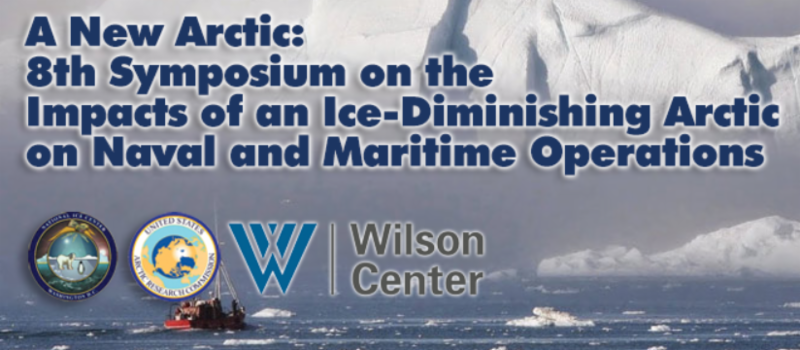
Mark your calendars to attend IDA-8, which some have called one of the best Arctic gatherings around. Historically, this biennial symposium was co-hosted by U.S. National/Naval Ice Center (NIC) and the US Arctic Research Commission (USARC). In 2019, these partners will join forces with the preeminent Wilson Center's Polar Institute, as a third co-host. The now 2-day symposium will be held in the Ronald Reagan Building Amphitheater, in Washington, DC. The event will focus on a broad cross-section of naval and maritime operations and issues in an ice-diminishing Arctic. The symposium brings together nationally and internationally recognized experts on Arctic governance, geopolitics, marine operations, infrastructure, science, and environmental observations, from the local, regional, and pan-Arctic scale. Information on prior symposia, including lists of speakers, video clips, and copies of presentations, is available here. Attendance is free, and registration will begin in Spring 2019. The event will be webcast live, and video recorded.
 of the AAG includes over 8,500 geographers converging from the U.S., Canada, and nearly 60 other countries in a typical year including geographers, GIS specialists, environmental scientists, and other leaders for the latest in research and applications in geography, sustainability, and GIScience. of the AAG includes over 8,500 geographers converging from the U.S., Canada, and nearly 60 other countries in a typical year including geographers, GIS specialists, environmental scientists, and other leaders for the latest in research and applications in geography, sustainability, and GIScience.
|
|

  
4350 N. Fairfax Drive, Suite 510
Arlington, VA 22203, USA
External links in this publication, and on the USARC's World Wide Web site ( www.arctic.gov) do not constitute endorsement by the US Arctic Research Commission of external Web sites or the information, products or services contained therein. For other than authorized activities, the USARC does not exercise any editorial control over the information you may find at these locations. These links are provided consistent with the stated purpose of this newsletter and the USARC Web site.
|
|
|
|
|
|
|
|
|